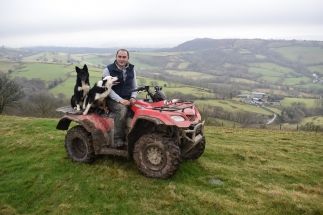- Home
- News & Industry
- Recording “Wizard” Huw applies lambing magic to his “flock family tree”
Recording “Wizard” Huw applies lambing magic to his “flock family tree”

Lambing is in full swing and one of HCC's very own “Wizards of Oz” is now busy applying the genetic “magic” he learned in New South Wales to improve flock quality, health and returns on his Carmarthenshire farm.
Huw Williams, of Banc Farm near Talley, won a HCC Scholarship to enable him to develop the potential of DNA Shepherding and EID Tracking systems to record sheep with efficient breeding for the marketplace with consumer appetites firmly in mind.
“The successful ram breeder knows exactly the genetic background of each and every sheep on the farm – the ‘flock family tree’, if you like,” said Huw, who studied recording systems in operation in New Zealand and Australia.“I wanted to find out how each system worked, how reliable they were, their suitability to Welsh hill farms and the cost of introducing and running them.
“Accurate identification allows the farmer to gradually take out the bottom third – the poorest performers – and build a healthier flock that meets market requirements.”
A graduate in Animal Science from Aberystwyth University, Huw has worked at a processing plant as a technical officer, as a lecturer for Carmarthenshire’s Coleg Sir Gâr and a Technical Advisor with Innovis.
He learned his farming trade by helping his father but, as he grew more involved, he was keen to introduce different innovations into the farming process. This led Huw, with the support and help of his father, to rent his own land and to start to build his own business alongside continuing to help with the family farm. Huw now rents 200 acres as well as helping out on his 400-acre family farm.
On his 2015 HCC scholarship, Huw studied DNA Shepherding in New Zealand and EID Tracking in Australia, whilst also looking at more traditional methods in both countries.
System costings, based on an 800-ewe flock rearing at 150 per cent, varied greatly. “At the time, the DNA Shepherd was the most expensive at £10 per lamb; tagging at birth worked out at £2.33, EID tracking £2.08 and Mothering Up £0.50.
“I felt DNA Shepherd was the most farmer-friendly method,” said Huw. “The accuracies were very good, samples were easily taken but, of course, it is more costly. However, guaranteed parentage is importantfor stock sires and the production of rams in a commercial environment.
“The EID Tracking I witnessed utilised Sapien PedigreeScan technology. It involved an initial outlay of money but was relatively cheap after that and has a huge potential in commercial enterprises. It helps identify better performing ewes to keep in the flock.
“Tagging at birth can create work at the point of lambing and this became evident at the different farms that I visited. However, the ability to score the ewe for the mothering ability at the point of lambing was a very important benefit, you can score traits such as teat placement, and it facilitates an improved speed and success for ewes and lambs to mother up after handling.”
Huw felt his commercial life had changed dramatically by having the chance to see the systems in operation: “These impressive visits demonstrated to me that careful and organised recording will lead to increased performance.”
It has led to him make changes on his own farm. “I am now really keen to ensure I know what I’m breeding. I am introducing a low input, high output system, and keep an efficient, self-replacing flock.I will be selecting the best performing ewes over the next couple of years, and, using DNA Shepherd, I will target a 65Kg ewe weaning lambs equalling her tupping weight,” he concluded.

